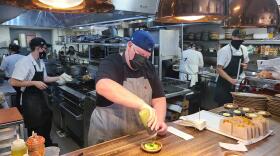Restaurant and bar patrons are accustomed to leaving a percentage of their bill as a tip to the person who served them their food and beverage. At least, the server hopes the customer will acknowledge their work with a monetary nod.
A server’s livelihood depends on his or her ability to deliver a quality customer service experience. But many have discovered the customer is not always right, especially if they cross the line when it comes to verbal or physical harassment.
According to a survey by the Restaurant Opportunities Center, a union activist group, tipped workers experience harassment at a higher rate than non-tipped workers. The study also found that the restaurant industry is the single-largest source of sexual harassment charges filed by women with the Equal Employment Opportunity Commission.
The group asserts that a server's reliance on a tip is what may hinder them from putting a stop to any unwanted behavior from a customer.
An articlein the Washington Post quotes officials from the National Restaurant Association refuting the labor group's claims, saying that it's an effort to confuse the reality of the tipped worker's wages which, they claim, are very healthy.
Bureau of Labor statistics put food and beverage service jobs at a whopping 134,000 in Las Vegas. That number isn’t surprising given everything Las Vegas is known for, but it also makes for an interesting landscape for the many who work in these positions.
Although the federal tipped minimum wage is $2.13, employers are legally required to make up the difference of the regular minimum wage ($7.25) if the tips fall short. According to Tips Work Coalition, a non-profit advocacy organization for the benefits of the tipped wage system, their coalition member servers earn an hourly average wage between $16-$22. The coalition has a mission to educate the public about the economic and growth opportunities of tipped wage workers.
Serving often requires strong physical capabilities of being on your feet, odd hours, extensive knowledge of the food and beverage menus offered and, of course, the ability to occasionally deal with unruly customers.
Some say one's appearance has a lot to do with whether or not someone gets a good tip, and servers may even flirt with their patrons and put up with behavior they wouldn't normally. KNPR checks in with some in the industry who know the ins and outs of what drives a good paycheck.
GUESTS
Lisa Moll, Ph.D student of Hotel Administration at UNLV, with focus in organizational behavior
Miranda Kitterlin, professor, Florida International University
Jenna Kaufmann, former server
Copyright 2015 KNPR-FM. To see more, visit http://www.knpr.org/.








